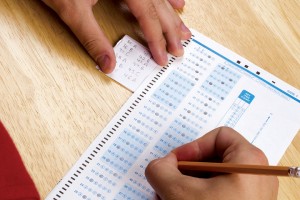Where there are students and where there are exams for them to take under stressful and monitored conditions, there will be cheating. The two go hand in hand. 6″For one, there is the thrill of pulling it off. Second, I tell you, there is no point in cramming all the information that is available at a click of a button! What they should be testing is the ability to apply this information in different scenarios and solve problems. But no, that is not possible since the paper setters themselves do not want to put any thought into it. All they do is rehash the previous years’ papers,” says FYBCom student Nehal Kothari, who is unrepentant about carrying chits to all her exams.
The Revision of Rules
In this light, the recent revision of rules in dealing with cases of cheating by the Maharashtra State Board for Secondary and Higher Secondary Examination does not matter much, many seem to think. Some of these revisions include a penalty for purchasing or holding a copy of an exam question that has leaked. “Can you imagine this was not looked upon as an offence and was not punishable either?” asks incredulous class 12 Hindi teacher Anjana Naval. And yet, students caught with as little as a blank piece of paper in the exam room were banned from taking the board exam for a year. “Just a plain piece of paper. What, are they writing and reading with invisible ink?” Naval asks.
When Students Go Wild
The changes address certain common problems in the board examinations of class 10 and 12. Taking an answer booklet from another student, for instance, while threatening anyone in the class can land a student behind bars. But what if the examiner himself has allowed cheating? “I remember in my economics exam, many were struggling and had morose faces. The examiner was young, and during the last 15 minutes he latched the door of the room and allowed us to ‘go wild,’ of course quietly, and make the most of the time, whether asking others or looking up the text book. I am sure that night he got many blessings and he must have helped many people cross over from the red line of failure to the happy line of pass, just through that gesture,” says third-year LLB student Tasneem Muchhala. Many, like Muchhala, have the outlook that no harm was done, but then there are those who deem it primarily a disciplinary issue. “Many of the existing rules were not updated to address new ways of cheating that students use,” says Naval; an understatement given that the existing rules were drawn up in 1994. Even then the rules were ambiguous, particularly about the proper punishments to be dispensed for different offences.
The New Rules
The new 2012 regulations have expanded in scope to include various new forms of cheating. “The newer ways of cheating make the most of technology at hand,” says Naval. “There are entire books stored in the portable document format (PDF) on the phone. Every student today has a smart phone that is connected to the Internet. You make the permutations and combinations for the various ways one can cheat!” And then there is a whole host of higher level cheaters of perpetrating offences that cannot be so easily regulated.
Ravi Gupta (name changed), 21, takes the class 10 or 12 exams for a different student each year. He charges a flat fee of Rs. 30,000 for sitting for all the papers. The hall ticket and other documents are taken care of by a certain ‘agent’. “You won’t believe it, how many students want the easy way out since they are only looking for the qualification, not for the degree. I get at least 15 to 20 inquiries every year, and I use my own screening process. If the class 10 and 12 exams are not overlapping, I take up one student in each, otherwise I go for one, charging a little extra,” Gupta says. There is one guarantee: the student will pass; Gupta has never let a student down. Though some are flabbergasted by the success of these schemes, others, like Naval, see it as a reflection of larger socio-cultural issues. “In a country where corruption has reached such dizzying heights, why should one wonder? It is only food for thought.”
Volume 1 Issue 12




























